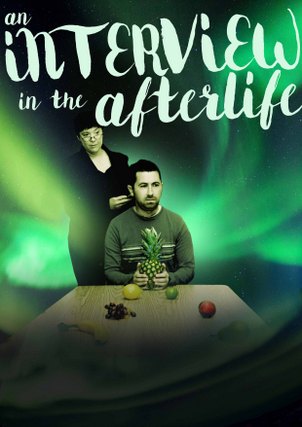Stephen ‘Percival’ Thornton isn’t doing so great. In fact, he’s dead, by his own hand, and to make matters worse he has to explain to an impatient, bureaucratic angel by the name of Ms. Hope why he would do such a thing. Unfortunately for him, his ongoing ignominy doesn’t end there in writer and director Matthew Wignall’s delightfully absurd and bleakly humorous tale An Interview in the Afterlife.
Suicide and the afterlife are oft-used narrative hooks that can present difficult tonal hoops to jump through, but Wignall manages to make his mark via sheer, inventive verbosity and a winning cast who tackle an oddball yet recognisable ensemble of characters with great charm and heart.
The story uses a familiar structure of flashing back and forth from an office in the afterlife to Stephen’s flat on earth to reveal the many misadventures and revelations that compelled him to take his own life.
Stephen is played with beautifully committed relatability by Matt Pattison, who is rarely off stage for the duration of the run time. It is a surprisingly tricky role, with Stephen largely being a reactive presence in the story, who frequently lets his misanthropy get in the way of his hopes of being a better person. In less sure hands, the character could have come off much less likable, but Pattison keeps the audience engaged with his character’s malaise throughout.
Shining supporting cast
He is ably joined by Andy Love as Farrington, the new roommate who descends on Stephen as the unwitting catalyst for his spiral into depression. Farrington, in many ways, is the co-lead of the tale. Love bestows the ridiculously loquacious character with an amusingly nervous energy that could easily have come off as creepy, but instead makes him loveable. He also impresses when delivering some incredibly tongue twistingly difficult lines for any actor with great conviction.
The rest of the cast shine equally and with effortless chemistry. There’s Charlie Voltaire and Teej Jackson’s hilarious double act as Stephen’s so-called friends, Gemma Curry’s gruffly cantankerous ex, Anna Rose James’ beautifully successful manic dream pixie girl with a deliciously thought provoking secret and Elizabeth Lockwood’s weary angel.
As the story moves to its inevitable climax, Wignall’s master stroke is revealed with a wonderfully judged twist in the tail that pleasantly upends expectation and immediately encourages a repeat trip.
Despite these undeniable qualities, there are some issues. The rigid flashback structure can feel sluggishly paced at times, several scenes in the afterlife are too long. The aforementioned verbosity occasionally cries out for a scalpel as well. To be sure, there is some absolutely delightful word play here, it’s just not always warranted or feels entirely in character.
The show is aided by minimal but effective light and sound design by Dan Sparrow, as well as an uncluttered set that gives the cast the room to gesticulate as the energetic script requires. It would have been interesting to have a bit more visual design for the afterlife. There are also certain references to Stephen’s flat, particularly Farrington’s obsession with alphabetising everything, that would have been fun to see, but with the constant swapping between planes of reality it was probably wise not to risk slowing down scene transitions with the constant resetting of props and backdrops.
An Interview in the Afterlife takes a well-worn story set up and and succeeds in suffusing it with its own unique voice, wit and surprise. It’s well worth taking this trip to the other side.




